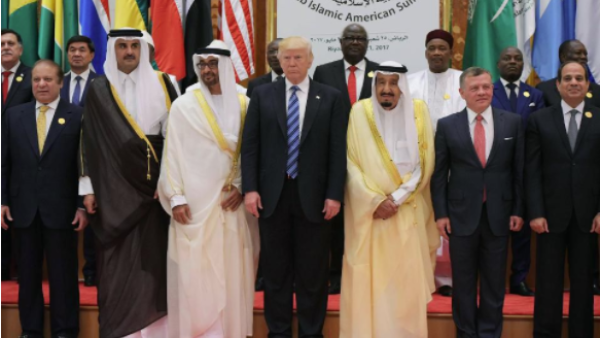The blockade of Qatar has been a strange saga since its inception. In July 2017, the official Qatar News Agency was hacked and a story was planted about Qatari Emir Tamim bin Hamad al Thani advocating closer relations with Iran, and defending Hezbollah and Hamas. Despite Qatari denial of the story, Egypt, the United Arab Emirates, Saudi Arabia and Bahrain instigated a blockade of Qatar, on the grounds that the Qataris were supporting terrorist groups. A number of other neighbouring nations then severed or downgraded their relations with Qatar.
Several alternative reasons for the blockade have been debated by analysts – football, different responses to the Arab Spring, the influence of Qatari media outlet Al Jazeera. All no doubt play their parts. But the latest development in the story features the most outlandish push yet to isolate Qatar, and it raises the question of whether the blockade is set to undo several decades of Gulf regional policy.
In mid-April, it was reported that Saudi Arabia is looking to “turn Qatar into an island”, by building a canal along Qatar’s sole land border, which runs alongside Saudi territory. The plans go beyond just digging a channel, however. According to reports, the border area will become a new industrial zone, with the possible net result of shipping routes being able to bypass Qatar entirely. But the wide variety of projects planned for the border area have led to scrutiny of the ultimate aims of the exercise. Robert Mogielnicki, a senior analyst at the Siwa Group consultancy and a specialist in Gulf Affairs, told Al Bawaba:
"The Saudi proposal to create a channel along its land border with Qatar possesses multiple, and at times contradictory, objectives. It is unlikely that Saudi Arabia will move ahead with the entirety of these differing initiatives, which include building ports, a free trade zone, hotels, a military base, and a nuclear waste disposal site. Instead, the various components of the proposal appear aimed at sending a message of strength to Qatar."
One might indeed expect that getting investment for hotels and resorts near a military base and a nuclear waste disposal site would be an uphill struggle. So if the construction of such a canal is predominantly a signal to Doha, it suggests that isolating Qatar has overtaken regional integration as a foreign policy priority. The Gulf Cooperation Council (GCC) was established in the early 1980s, to foster a regional alliance between the energy-rich Gulf states. Its six members are Saudi Arabia, Qatar, Oman, Kuwait, the United Arab Emirates and Bahrain. With similar cultural, demographic and economic features, and with a number of shared foreign policy concerns, the case for closer cooperation among Gulf states was a strong one.
That said, the GCC members have not always acted in unison.. When Bahrain experienced its own Arab Spring protests, led by Shias opposed to the Sunni monarchy, Saudi Arabia and the UAE sent in troops to quash the unrest. However, Kuwait, Oman and Qatar did not contribute to the intervention. Qatar has fallen out of favour among the member states before. The last time in 2014 over its support for the Muslim Brotherhood, which Saudi Arabia and the UAE have labelled a terrorist organization.

GCC Members (2011) /AFP
Nevertheless, throughout the disagreements there have still been pushes for stronger ties between GCC members, and even talk of creating a federation. However, this new plan suggests that such integration is being put on very long-term hold. Dr. Bessma Momani, an expert in the international relations of the GCC at the University of Waterloo, told Al Bawaba:
“Building a physical channel between Saudi Arabia and Qatar is an extreme separation. The GCC was meant to emulate the European Union, with common market, regulations, and free movement of people. This proposed channel will only hamper future integration. While the building of this channel will not change Qatari calculations, it signals that the Saudis are in this for the long haul and are willing to quite literally physically separate from the Qataris”
Qatar’s options for responding to the blockade, and to the new canal project, are limited. Whilst its vast wealth has insulated it from many of the blockade’s risks, this stalemate has certainly come at a heavy cost to the Emirate. Doha has made the best of its lobbying capacity in America. Qatari delegations have organized events and meetings in a number of political circles that the Trump administration will find friendly. It has also courted a number of American Jewish figures on the pro-Israeli right, including the President of the Zionist Organization of America Mort Klein, with the apparent view of winning Israeli backing.
Qatar was received more sympathetically by some members of the Trump cabinet, including Secretary of Defence James Mattis and former Secretary of State Rex Tillerson. However, now that Tillerson has been sacked, it may find itself struggling to be heard, particularly as Trump seems to overwhelmingly favour Saudi Crown Prince Mohammed Bin Salman. Whichever way the blockade develops, America will ultimately have a role to play. But the new channel project will not necessarily change things in the immediate future. Dr. Steffen Hertog, an expert in Gulf political economy at the London School of Economics told Al Bawaba:
“Doha is likely to denounce the plan, but it will try to avoid any escalation and instead present itself as the voice of restraint or the “adult in the room”, a message that has met some success in the West. The immediate practical consequences would be limited as the border is closed anyway and Qatar has already rerouted all its trade. It would make a resolution of the current conflict much more difficult, however. I cannot imagine that the US military will be happy with having its key airbase in the region permanently cut off from the adjacent landmass, but under Trump it is difficult to predict whether and how the US would step in.”
With little to show from their American connections at present, Doha is now apparently trying to embarrass the Saudis with awkward details about the Saud dynasty’s history. The Qatar National Library published a sheaf of historical documents this week, which reveal that King Abdulaziz Al Saud, the founder of the third Saudi state, received personal favours from British colonial governors in exchange for limiting his own influence.
For now, it seems, that all parties to the stand-off are not backing down, but digging in. Attempts by fellow GCC member Kuwait to mediate have not ameliorated the situation. But for now, it must be asked whether this means that the GCC dream of united states is over.







